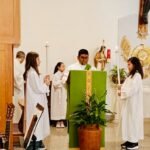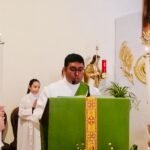
Gospel according to Saint Luke 10:38-42:
Jesus entered a village where a woman whose name was Martha welcomed him. She had a sister named Mary who sat beside the Lord at his feet listening to him speak. Martha, burdened with much serving, came to him and said, “Lord, do you not care that my sister has left me by myself to do the serving? Tell her to help me.” The Lord said to her in reply, “Martha, Martha, you are anxious and worried about many things. There is need of only one thing. Mary has chosen the better part and it will not be taken from her.”
Family Life
Luis CASASUS President of the Idente Missionaries
Rome, July 20, 2025 | XVI Sunday in Ordinary Time
Gen 18: 1-10a; Col 1: 24-28; Lk 10: 38-42
I have always found the conversation between Jesus and the two sisters, Martha and Mary, to be an example of family dialogue, where nothing is hidden and everything is shared in trust.
For example, when Jesus receives the news of Lazarus’ death, we hear Martha say: If you had been here, my brother would not have died. But I know that even now God will give you whatever you ask of him (Jn 11:21-22). This reflects a familiarity and frankness that few had with Christ. Some of his disciples preferred to speak behind his back.
Let us remember that it was not proper for women to sit at the feet of a spiritual teacher to receive religious instruction. That position was symbolically that of a disciple, a role reserved almost exclusively for men in the rabbinical world.
Jesus not only allows this attitude, but praises it, saying that Mary has chosen the better part. This gesture breaks with the legalistic norms of his time and shows how Jesus challenged social structures by including women as disciples in his inner circle. In his response to Martha, there are no signs of rebuke, but surely a call for ever deeper attention, for it is unlikely that this helpful and intelligent woman was not listening to the words of the Master. In fact, we later hear her say: Lord, I believe that you are the Christ, the Son of God, who is to come into the world (Jn 21:27).
The Divine Persons have no limits when it comes to revealing themselves to us. We all remember the famous phrase of St. Teresa of Avila: God is in the pots and pans, which reminds us how our prayer can—and should—be constant in all kinds of activities, just as in moments of contemplation or study.
We could illustrate the thousand forms of divine presence with a little legend.
The garden and the tower. In a valley hidden among mountains, there lived two religious men who were part of a silent community. One, named Abel, cultivated a garden. From dawn, his hands touched the earth, he listened to the birds, and he cared for each sprout as if it were a miracle. The other, Zechariah, spent hours in a stone tower by the river, writing, meditating in prayer, and contemplating the flow of the water.
One day, a traveler came to the valley and asked the inhabitants of the nearby village, Which of the two is closest to God?
Some said, Abel, without a doubt. His work sustains life, provides food, and beautifies the world.
Others replied, Zachariah is the wisest. He listens to the whispers of mystery and writes words that heal.
The traveler, curious, climbed the hill to see them. He found Abel covered in dirt, laughing with a little girl who was learning to plant seeds. Then, in the tower, he heard Zachariah’s silence, so deep that the murmur of the river sounded like a prayer.
The traveler did not choose. He understood that the garden and the tower were one. That God can be found in the root that is watered or in the verse that springs from the heart.
Zacharias descended from his tower every evening to walk among the paths of the garden. Abel, seeing him coming, put down his tools and prepared a bench among the lavender bushes. There they would sit together, in silence or sharing prayers, thoughts, memories.
Zacharias would read his writings to Abel, and Abel would respond with stories born from the earth. Zacharias spoke of God as a river that flows without pause; Abel saw Him in the sprouting mint and in the sweetness of carefully picked fruit.
One day, they planted an olive tree together in the center of the valley. They said it was for the traveler who would return one day, but they both knew it was also for them: a common root.
Over time, the garden filled with tablets bearing Zacarias’s phrases, and the tower was covered with pots of plants that Abel had prepared.
Neither changed his occupation, but they learned to live in each other’s lives as well.
When they died, just a few days apart, they were buried next to each other under the olive tree. And they say that since then, the branches of that tree whisper all year round, as if the earth and the sky were greeting each other in communion.
When Christ is in our lives, we cannot ignore each other. If I truly want to imitate Christ, I will take an interest in everything that occupies the life of each of my brothers and sisters: health, work, apostolate, study, family, or talents to be developed, in the certainty that each one is unique and that, in each one, Providence seeks to reap the best. As St. Paul reminds us: Are all apostles? Are all prophets? Are all teachers? Do all work miracles? (1 Cor 12:29).
—ooOoo—
The active presence of God is more universal than we imagine. Another thing is our willingness and attention to be aware of it. The First Reading offers us another episode of hospitality, with unexpected consequences. In this scene, Abraham is visited by three mysterious figures near the famous oaks of Mamre. He hastens to welcome them, offering them water, food, and rest. This act of generous welcome is more than cultural courtesy: it becomes a sacred encounter. The heart of the passage lies in the promise: one of the visitors declares that Sarah will give birth to a son within a year, despite her advanced age. This moment underscores God’s faithfulness and power to fulfill promises that seem impossible according to human standards. Thus, this passage invites us to reflect on how we welcome the divine into our lives, often disguised in the most ordinary things, especially in encounters with our neighbors, and how an authentic spiritual dialogue can take place with the Father, the Son, and the Holy Spirit about how to help others.
This allows us to better understand the Second Reading, where Paul speaks of “completing in his flesh what is lacking in the sufferings of Christ.” Obviously, this does not mean that Christ did not finish his mission, but that he desired our collaboration in the form of witness, so that every human being, contemplating our modest example, might become sensitive to the permanent action of the Holy Spirit in their own lives.
In some saints, this occurs in a striking way, and every event, seemingly trivial or insignificant, impels them to live the divine will, so that an authentic dialogue—not of words—takes place with the Father, the Son, and the Holy Spirit. But we all have some experience, however modest it may seem, of this Inspiration that leads to Dialogue with the Divine Persons:
* In silent prayer, the soul becomes silent and opens itself to the presence of God. It is more a matter of “being with” than “saying to.” We have the impression of never being alone.
* St. Paul tells us that the Spirit himself intercedes for us with groans that words cannot express(Rom 8:26). In other words, there is a spiritual communication that transcends human language.
* In the concrete experience of obedience and love, every act of surrender or fidelity has all the characteristics of a dialogue with God, of a silent response to his grace.
* Many times, we feel in our conscience an inner movement, a light, a peace or a restlessness that guides us powerfully. Little by little, we realize that it is a form of divine communication.
When we share our spiritual experience in the Examination of Perfection, we declare whether we have perceived the Inspiration received in a continuous manner. Our Father Founder uses the concept of Inspiration in a more precise way than we normally do: to be inspired means to be absorbed, caught up as if by a heavenly whirlwind, by a spiritual tornado that draws us closer to the divine persons to mark us with their intimate pain and shared joy.
This is not some luxury or whim of the Holy Spirit; we are victims of so many concerns, some of our own making and others imposed by daily demands, so “distracted and agitated by many things” that it is difficult to focus on what is truly important. But Inspiration comes to our aid. Surely, the most genuine spirit of the Gospel allows us to understand that we can attend to prayer and the concerns of each day at the same time.
It is worth remembering that there are privileged moments, however few, to modestly begin a dialogue with the Divine Persons.
A brother who has already passed away confided to me that after receiving the Eucharist or beginning his silent prayer, his “starting point” was always to bring before God his mistakes, his lack of patience, his faults… with which, he said, he was sure he obliged Christ to respond. This does not seem like a bad start to prayer, as it recalls Christ’s approval of the publican’s prayer:
The tax collector, who stood at a clear distance, did not even dare to raise his eyes to heaven, but beat his breast and said, “O God, have mercy on me, a sinner!” I tell you; this man went home justified before God. For everyone who exalts himself will be humbled, and he who humbles himself will be exalted (Lk 18: 13-14).
_______________________________
In the Sacred Hearts of Jesus, Mary and Joseph,
Luis CASASUS
President













